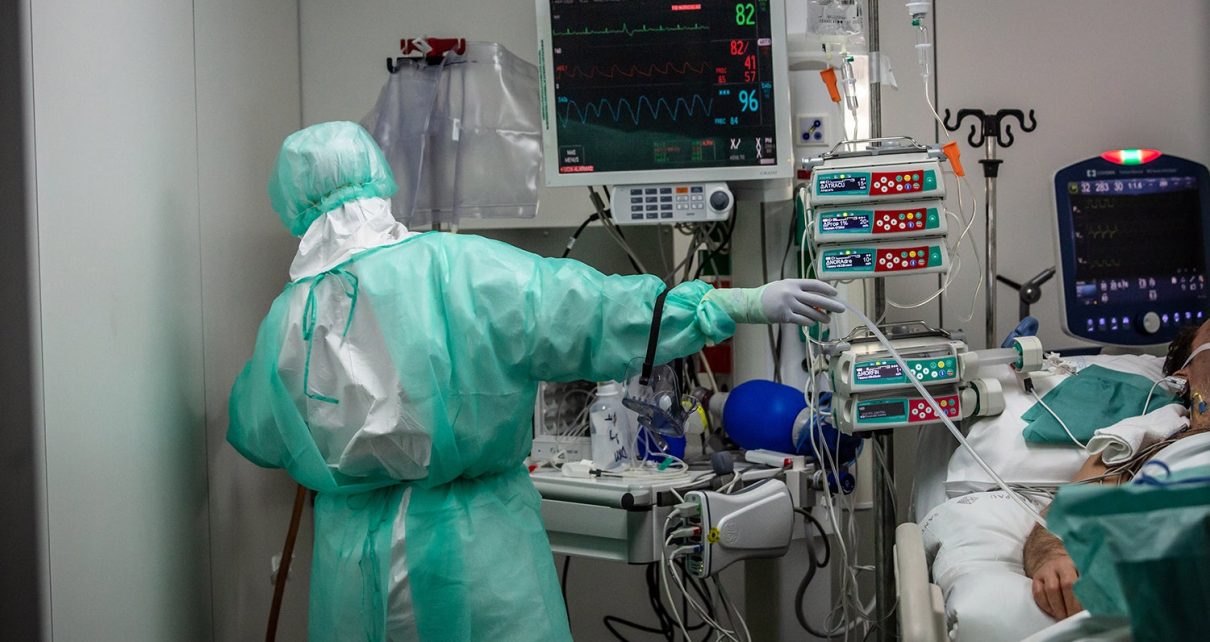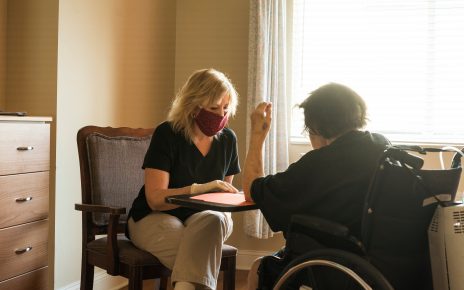As the COVID-19 pandemic continues to claim lives around the world, there are no specific treatments for the disease beyond supportive care. Several drugs already prescribed for other illnesses have shown promise against the novel coronavirus in preclinical studies. And they are now being tested in clinical trials or given to patients on a compassionate-use basis. But experts warn that these medications have yet to prove effective in treating COVID-19 patients.
As of this writing, the virus has infected more than two million people worldwide and caused more than 130,000 deaths. A vaccine and new treatments could take years to fully develop, but the World Health Organization recently launched a large international trial called Solidarity to test four existing therapies. They are the closely related malaria drugs chloroquine and hydroxychloroquine; the antiviral medication remdesivir (originally developed to treat Ebola); the antiviral combination of lopinavir and ritonavir (used for HIV); and those two HIV drugs plus the anti-inflammatory small protein interferon beta. A number of separate clinical trials of these medications and others are underway in several countries, including the U.S.
The U.S. Food and Drug Administration has approved remdesivir for treating COVID-19 patients under the compassionate-use protocol (a designation that gives patients with life-threatening illnesses access to an experimental drug). And the agency has granted an emergency use authorization—which allows for otherwise unapproved drugs or uses during an emergency—for chloroquine and hydroxychloroquine.
“None of these therapies are proven,” says Stanley Perlman, a professor of microbiology and immunology at the University of Iowa. Only the results of randomized clinical trials can show whether they work, he adds.
Here is what scientists know so far about some of the most prominent drugs currently being tested as treatments for the potentially deadly infection.
Chloroquine and Hydroxychloroquine
President Donald Trump has repeatedly touted the malaria drugs chloroquine and hydroxychloroquine as a treatment for COVID-19—despite a lack of clinical evidence that they work for the disease. The president’s comments set off a scramble among doctors and patients to obtain the drugs—which are frequently used to treat autoimmune diseases such as rheumatoid arthritis and lupus—and there is now a shortage of them in the U.S. Also, these substances can be dangerous in healthy people: a man in Arizona died after ingesting a fish-tank cleaner containing a type of chloroquine that is not approved for human use. On March 28 the FDA issued an emergency authorization for administering chloroquine or hydroxychloroquine to COVID-19 patients—but many experts say the widespread usage of these drugs is premature.
“The clinical support is very, very minimal,” says Maryam Keshtkar-Jahromi, an assistant professor of medicine at the Johns Hopkins University School of Medicine, who co-authored an article in the American Journal of Tropical Medicine and Hygiene calling for more randomized controlled trials of chloroquine and hydroxychloroquine. The drugs do “not show strong evidence at this point,” she adds.
A few preclinical studies have suggested these compounds could be effective at blocking infection with the novel coronavirus (officially called SARS-CoV-2), but there has been very little good evidence from clinical trials in patients with the illness it causes, COVID-19. A controversial small, nonrandomized trial of hydroxychloroquine combined with the antibiotic azithromycin in France suggested that COVID-19 patients given the treatment had less virus, compared with those who refused the drugs or those at another hospital who did not receive them. But experts have questioned the study’s validity, and the society that publishes the journal in which it appeared has issued a statement of concern about the results, according to Retraction Watch. (Scientific American reached out to the paper’s authors for comment but did not hear back from them.) A preprint study in China also claimed to show that hydroxychloroquine benefitted COVID-19 patients, but it had significant methodology problems, Keshtkar-Jahromi says. The issues included confounding variables, such as the fact that all of the subjects received other antiviral and antibacterial treatments.
Some scientists say the preclinical evidence is strong enough to support chloroquine’s use, however. “We know how it acts at the cellular level against the virus. We have preclinical proof,” says Andrea Cortegiani, an intensivist and researcher in the departments of anesthesia and intensive care and of surgical, oncological and oral sciences at the University of Palermo in Italy. “Second, it’s a cheap drug, available all over world,” adds Cortegiani, who is also a clinician at University Hospital “Paolo Giaccone” in Italy.
Chloroquine and hydroxychloroquine have been hypothesized to work against COVID-19 by changing the pH required for SARS-CoV-2 to replicate. Given their use in autoimmune disorders, these medications could also play a role in dampening the immune response to the virus—which can be deadly in some patients.
But these drugs’ cardiac toxicity is a concern, Keshtkar-Jahromi says. There have been some reports of myocarditis, or inflamed heart tissue, in people with COVID-19 who have not taken chloroquine or hydroxychloroquine. If patients receiving one of these medications die of heart complications—and are not in a clinical trial—doctors cannot know if the drug contributed to higher chance of death.*
A drug that modulates the immune response could also make someone more vulnerable to other viral or bacterial infections. “It’s a double-edged sword,” says Sina Bavari, chief science officer and founder of Edge BioInnovation Consulting in Frederick, Md., who co-authored Keshtkar-Jahromi’s article in the American Journal of Tropical Medicine. Giving a drug to suppress the immune system has to be done with extreme care.
“We are not saying, ‘Don’t [prescribe chloroquine],’” Bavari says. “We are saying, ‘More data is needed to better understand how the drug works—if it works.’”
Remdesivir
This experimental antiviral drug was developed to treat Ebola, and it has been shown to be safe for use in humans. It is a broad-spectrum antiviral that blocks replication in several other coronaviruses, according to studies in mice and in cells grown in a lab. In addition to the WHO investigation, at least two trials in China and one in the U.S. are currently evaluating remdesivir in COVID-19 patients. Results for the Chinese trials are expected later this month.
“As of this moment, we don’t have data for remdesivir in human COVID-19 disease,” says Barry Zingman, a professor of medicine at Albert Einstein College of Medicine and clinical director of infectious diseases at Montefiore Health System’s Moses Campus. The two related institutions, both located in New York City, recently joined a nationwide clinical trial of the drug. “Our patients are randomized, so we don’t know who’s getting the drug or a placebo. [But] we have seen some patients do remarkably well,” Zingman says. Trial results are on track for publication sometime in the next six to eight weeks, he adds.
As Scientific American reported previously, remdesivir works by inhibiting an enzyme called an RNA-dependent RNA polymerase, which many RNA viruses—including SARS-CoV-2—use to replicate their genetic material. Timothy Sheahan of the University of North Carolina at Chapel Hill and his colleagues have shown the drug is effective against the coronaviruses that cause severe acute respiratory syndrome (SARS) and Middle East respiratory syndrome (MERS), respectively, as well as some of the viruses behind the common cold. The team is currently in the process of testing the drug’s efficacy against SARS-CoV-2. A recent study of compassionate use of remdesivir in 53 severe COVID-19 patients found that 63 percent of those taking the drug improved, but it was not a randomized controlled trial.
“Remdesivir has some chance,” Perlman says. “If we can give [the drug] early in the disease course, it could work.” To know for sure, scientists must await the results of the ongoing clinical trials.
One limitation with remdesivir is that it must be given intravenously, so patients can only get it in a hospital. Sheahan and his colleagues at Emory University have recently developed a related drug called EIDD-2801, which can be taken in pill form. Like remdesivir, the medication works as a nucleoside analogue, interfering with viral replication. It was effective at preventing SARS-Cov-2-infected lung cells from replicating in a lab dish and related viruses from doing so in mice.
Ritonavir and lopinavir
The HIV drugs ritonavir and lopinavir (sold as a combination therapy by AbbVie under the brand name Kaletra) have been tested against COVID-19 in a few clinical trials. The initial data have not shown them to be effective, however. A study in the New England Journal of Medicine found they conferred no benefit beyond standard care.
The drug combination is what is known as a protease inhibitor, and it works by blocking an enzyme involved in viral replication. But its action is specific to HIV and so is unlikely to work for SARS-CoV-2, Perlman says. “If you have the key to a car, and you try to put it in your car, the odds of it working are one in a million,” he says. “Kaletra [targets] a completely different lock” than the one for COVID-19.
Nevertheless, the WHO trial includes a group of COVID-19 patients who will receive these drugs on their own—and another group that will receive them in combination with interferon beta, a small cell-signaling molecule used to treat multiple sclerosis. The molecule is a “massive orchestrator of immune response,” Perlman notes, so it must be used carefully. In mouse studies of the SARS and MERS coronaviruses, it halted the infections when administered early. When it was given later, he says, the mice died. Using a drug that activates the immune system could be helpful in the beginning of an infection, but giving it too late could be deadly.
Immune System Inhibitors
Researchers are also considering a number of other therapies that tamp down the rampant immune response seen in severe COVID-19 cases. Such a flood of immune cells in the lungs—known as a cytokine storm—can lead to death. Many of the sickest patients have elevated levels of an inflammatory protein called interleukin-6 (IL-6). Research in China has suggested that Actemra (tocilizumab), an IL-6-blocking antibody drug made by Roche, shows promise against COVID-19. And Chinese authorities have recommended the drug in their treatment guidelines. Roche has since initiated a phase III randomized controlled clinical trial for the medication. In the U.S., Michelle Gong—chief of the division of critical care at Montefiore and Albert Einstein and director of critical care research at Montefiore—and her colleagues are among dozens of groups conducting a double-blind, placebo-controlled clinical trial of a related drug called sarilumab, which is already approved for treating rheumatoid arthritis. Sarilumab will only be given to the sickest individuals: to be part of the trial, patients must be hospitalized with COVID-19 and in severe or critical condition.
Convalescent Plasma
Another treatment approach involves injecting COVID-19 patients with blood plasma from people who have recovered from the illness. The FDA recently issued guidance on the investigational use of such “convalescent plasma,” which contains antibodies to the coronavirus, and clinical trials are underway.
Blood from disease survivors has been used as a treatment throughout history—from polio-infected horses in the 1930s to former Ebola patients in 2014. “There is a long-lasting rationale for the use of convalescent plasma against any infectious disease,” Cortegiani says. One problem, however, is that scientists do not know whether people develop strong immunity against SARS-CoV-2. And it is not easy to collect plasma containing enough antibodies, he adds. Another issue is the shortage of eligible donors. Some companies are looking into ways to produce these antibodies artificially. In the meantime, a number of hospitals are searching for volunteers to donate plasma.
None of the therapies described above have yet been proved to treat COVID-19. But some answers can be expected in the next few weeks and months as the results of clinical trials emerge. Until then, Cortegiani says, “we cannot say, ‘This drug is more promising than the other one.’ We can only say, ‘There is a rationale for it.’”
Read more about the coronavirus outbreak here.
*Editor’s Note (4/16/20): This paragraph was edited after posting to correct Maryam Keshtkar-Jahromi’s comments about her concerns with chloroquine and hydroxychloroquine.




